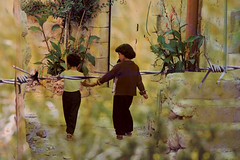We are the stories we tell ourselves. Or, as
Thomas King puts it: "The truth about stories is that that's all we are."
If I grow up being told I am a kind and generous person, always willing to lend a hand to help a fellow human in need, there's a good chance I will take this on as part of my identity, and become a kind and generous person. Certainly it is more likely than if I had been told all my life I am a mean and selfish goodfernuthin'.
If
we tell ourselves that what it means to be human is to be a rational self-interested individual, for which the greatest good is to act selfishly in the marketplace of life, well then we should not be surprised if we become greedy self-serving assholes, gleefully counting our giant SUVs and plasma TVs while children die of malnutrition outside our gated communities.
If we tell ourselves a great epic story of the world as a
Clash of Civilizations, we should not be surprised that our illustrious leaders invade other countries, you know, defensively, pre-emptively. Because it is our duty to shore up civilization against the invading barbarians who hate us for our... um... freedom to wear a bikini and watch American Idol.
What other stories do we tell ourselves?











